Data helps you understand your audience. It tells you how they do things, what they prefer, and who they are. You can certainly make business decisions based on gut feeling, but you're much more likely to hit the mark when you can validate assumptions with cold, hard facts.
Data and analytics help you measure the impact of your marketing efforts across different channels to see if there's something you need to do differently -- like target a different audience, post at a certain time of day, or experiment with a new content format.
Social media isn't any different than other aspects of your marketing in the sense that it can be measured and improved upon. That's why you'll be able to create a more effective Instagram strategy using Instagram Insights.
Here are the analytics on this channel that marketers need to know and understand -- and how to use them.
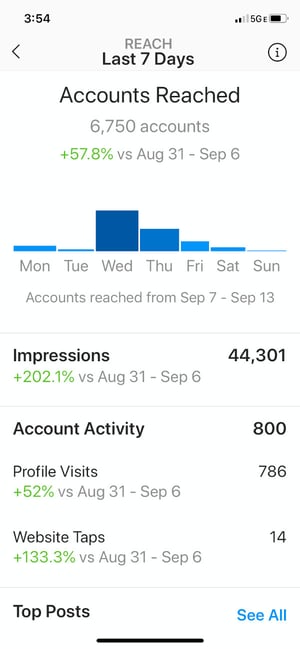
To use Instagram Insights, you must first have a business profile. If you're already using a personal account, you can switch to a business profile. Here's how to convert your account in a few simple steps.
1. Create a Facebook Business Profile for the same persona if you haven't already.
An Instagram business profile will allow you to access additional features and tools to help you grow your audience. However, in order to set up an Instagram Business Profile, you'll need to have a Facebook Page for your business. It's through Facebook that you add payment credentials and more. Click here for instructions for setting up your Facebook Page if you don't already have one.
2. Make sure your Instagram profile is public. Private profiles cannot be used as business ones.
You want to grow your audience and have your posts seen by Instagram users who are not familiar with your brand. For this reason, your Instagram profile will need to be made public before you convert it to an official Instagram Business Profile. Here are the steps:
Step One: Navigate to your profile and tap the hamburger icon in the top-right corner.![]()
![]()
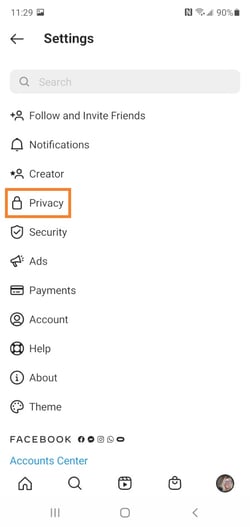
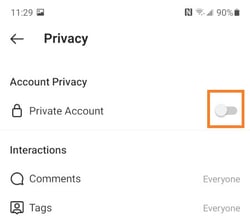
Your Instagram profile is now public.
3. Return to your Settings page and tap "Account."
Return to your Settings page by clicking the hamburger icon and tapping the gearshift wheel icon. Alternatively, you can use the back button on your phone to get there.
Tap Account in the Settings menu.
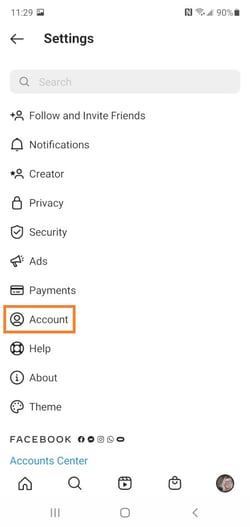
4. Select "Switch Account Type" and choose "Switch to Business Account."
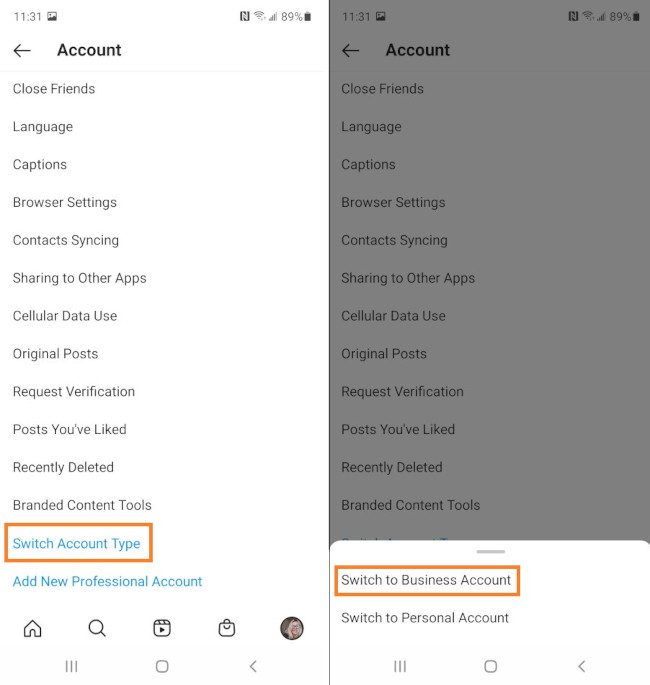 By choosing Switch to Business Account, you're effectively converting your Instagram Profile into an Instagram Business Profile.
By choosing Switch to Business Account, you're effectively converting your Instagram Profile into an Instagram Business Profile.
5. Follow Instagram's prompts to set up your business profile.
You will be asked to review and change details about your business including business category, contact information, and more. You'll also be prompted to select the Facebook Page you want to be associated with your profile (from Step 1).
6. Tap "Done."
Once your set up as a Business Account, you can begin to use Instagram Insights. Here's how to get started.
1. Open the hamburger menu and click "Insights."
To view insights into your overall Instagram account, start by visiting your profile. Then, at the top, click the hamburger icon and select Insights from the menu.
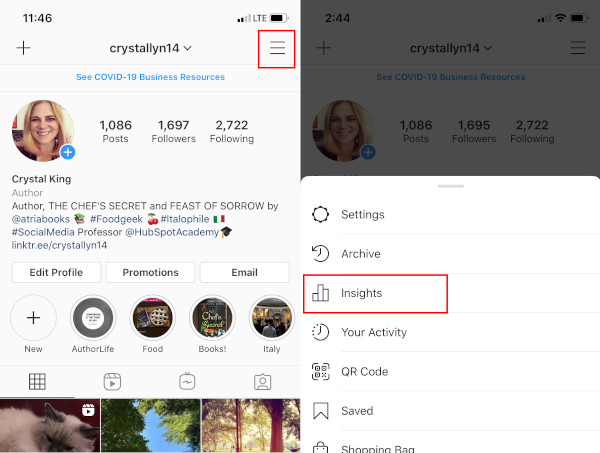
From there, you'll reach the Recent Highlights page where you'll see some general information about how people are engaging with your profile, like how many followers you gained or lost in the past week.
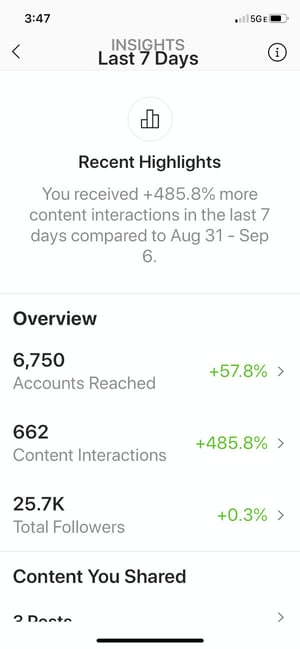
Next, we'll get into the more specific profile insights you can explore.
2. Measure reach.
Click the Accounts Reached section. Reach reflects the number of unique users that have seen any of your Instagram posts.

Within this category, you'll see insights for:
- Impressions - How many times your posts were seen.
- Account Activity - Profile visits, website taps, and other activity.
- Top Posts - The posts that generated the most reach and engagement.
- Top Stories - The Instagram Stories posts that generated the most reach and engagement.
- Top IGTV Videos - The IGTV videos that generated the most reach and engagement.
Some of these insights can be expanded for more insights.
3. Track profile visits and followers.
On the Accounts Reached page under Account Activity, you'll be able to see Profile Visits.
Profile Visits reflects the number of times your profile has been viewed.
4. Determine website clicks.
Website Taps can also be found under the Account Activity section. This insight reflects the number of times any links you've included in your business profile have been clicked.
5. Track content interactions.
Navigate back to Recent Highlights and tap Content Interactions. This will bring up a page that shows how your content is performing in terms of engagement, breaking down the metrics by content type.
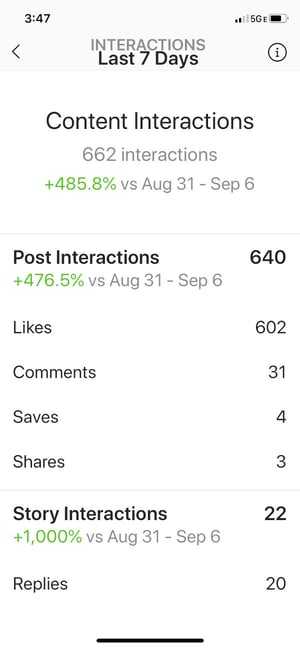
Likes speaks for itself, reflecting the number of users who liked your post. As with likes, Comments reflects the number of comments left on your post. Saves highlights the number of unique users or accounts who saved your post or clicked the bookmark-like icon that appeared below it in their feeds.
6. Track your followers.
Navigate back to Recent Highlights and click Total Followers. You'll then reach the Follower Breakdown page.
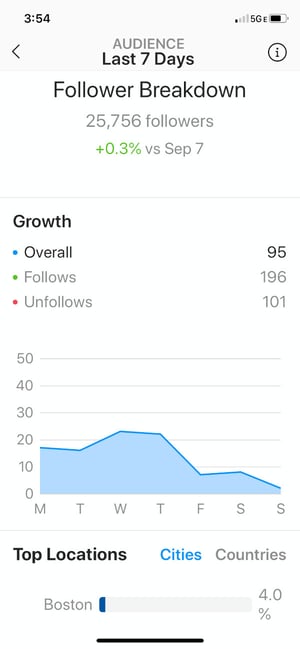
This page reflects how many followers you've gained or lost over the past week, as well as the average times of day when your followers are using Instagram — data that can be highly beneficial when planning posts.
7. Learn which actions were taken on your post.
To view insights for a specific Instagram post, start by visiting your profile. Tap on the post you'd like to look into, then click View Insights below the image.
These insights indicate the number of actions that users took on your profile as a result of seeing your post -- things like visiting your profile, then taking an action like clicking on your website link or following you.
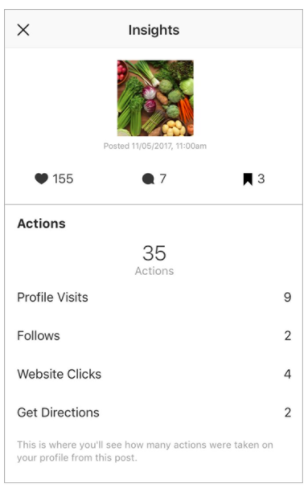
Source: Instagram
8. Use "Discovery" to see where your post showed up in feeds.
As the name might suggest, these insights indicate where your post was seen -- or discovered -- the most, including how many accounts weren't already following you when they first saw the post.
This section includes metrics on Impressions, which reflect the number of times your post was discovered from a particular place within Instagram, like the user's home feed, a search, your profile, a location tag, or a hashtag.
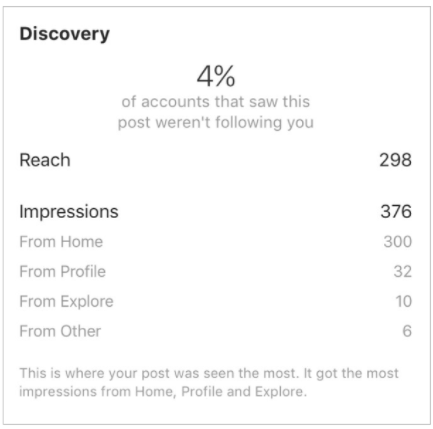
Source: Instagram
Discovery insights also include data on a post's reach -- which reflects the number of unique accounts that saw your post.
9. View Story insights.
Finally, Instagram users with a business profile are able to view insights into their ephemeral Stories.
To view your Story insights, navigate back to Insights and scroll down to Content You Shared section on the Recent Highlights page.
Scroll down to the Stories section, and you'll be able to see insights for older stories, as well as any that have not yet expired.
Next, we'll get into the more specific insights you can explore.
Impressions
This insight represents how many times your Story was seen.
When viewing these insights, keep in mind that you're able to add multiple images or videos to your Story. When you do this, every piece of visual content in your Story is counted as a single photo or video in your post.
Let's say you add six photos to your Story. Whether someone only views one or views all six, Instagram only counts your entire Story having received one impression.
The same goes for Story content that has been viewed by a single user more than once. Instagram still only counts that interaction as the entire Story having received one impression.
Reach
This insight reflects the number of unique users that have seen your Story.
Taps Forward
This insight reflects the number of times a user taps your Story photo or video to skip to the next piece of media.
Taps Back
This insight reflects the number of times a user taps your Story photo or video to go back to the previous piece of media.
Replies
This insight reflects the number of times users send messages through the Send Message text box on your Story.
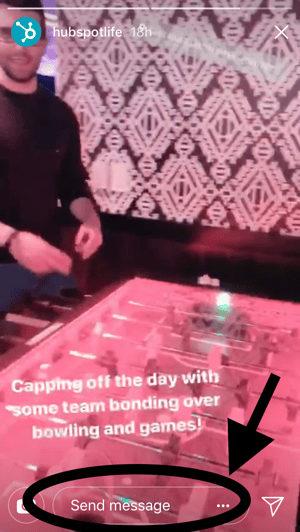
Swipe Aways
This insight reflects the number of times users swipe to skip to the next account’s Story -- not to be mistaken for "tap forward," which reflects users skipping ahead to your next piece of Story media.
Exits
This insight reflects the number of times a user leaves the Stories section entirely to return to the home feed.
Measuring Your Effectiveness With Instagram Insights
Now that you know how to access data to inform your strategy with Instagram Insights, you can analyze that data and determine what's working for your audience (and what's not). From there, creating content that gets a ton of engagement will be a lot easier as you consider those benchmarks.
Editor's Note: This post was originally published in January 2018 but has been updated for comprehensiveness.
from Marketing https://ift.tt/3cJq8LW
via


No comments:
Post a Comment